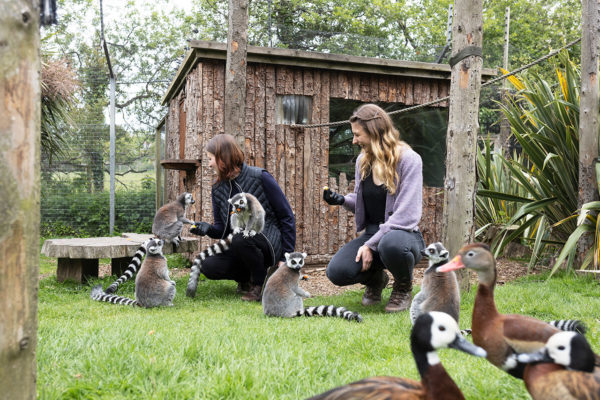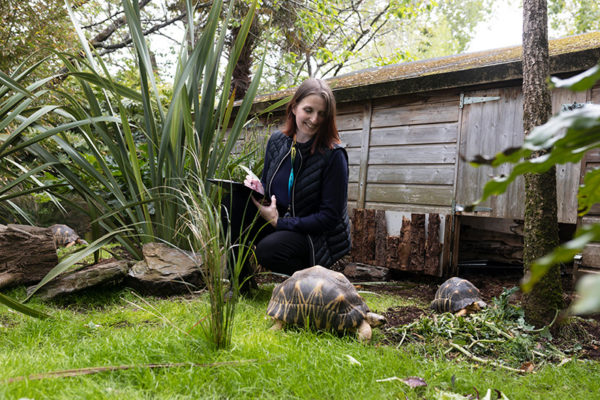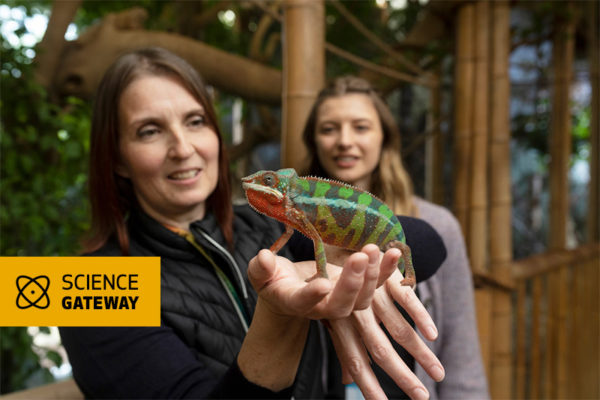BSc (Hons) Applied Zoology (Top up) degree
Newquay University Centre Cornwall College - 23 September 2024
1 Year full-time (or 2 years part-time)
Full-time

BSc (Hons) Applied Zoology (Top up) degree
 • Highly flexible content that allows you to tailor your degree around your own interests within the field of Zoology
• Highly flexible content that allows you to tailor your degree around your own interests within the field of Zoology
• Small boutique-style University Centre campus
• Direct (free) access to Newquay Zoo (part of the Wild Planet Trust) located adjacent to our Newquay University Centre campus, as well as Blue Reef Aquarium located a short walk away.
• Located on the edge of a Marine Conservation Zone, we make full use of the stunning marine and terrestrial environments on our doorstep for trips and field studies.
• Opportunities to join international field trips to, for example, Honduras and Borneo, to gain field experience and network with academics and field staff from all over the world (additional fee applicable).
Understanding of our deep-rooted connexions and interactions with animals and the environment is essential to tackling the challenges faced by modern society. The BSc (Hons) Applied Zoology prepares students to take on those challenges, equipping students with the skills needed across a broad range of career paths. Our graduates go on to be successful within the conservation and animal care sector as well as postgraduate study.
This course provides students with a relevant foundation degree or HND to ‘top-up’ to gain a full BSc (Hons) bachelor's degree. The programme has been designed to run as either a one-year full-time or two-year part-time programme.
The course content allows students to develop their own academic profile through optional modules and research project choices. This gives students a high level of autonomy and flexibility, allowing them to tailor the programme to their own interests and expected career path. This flexible approach makes this course ideal for students coming from a wide range of backgrounds within the general field of zoology, animal management, ecology and conservation.
Modules cover a range of subjects including wildlife conservation, animal behaviour, impacts of disease and science communication.
The programme has been designed to develop skills and knowledge which are highly relevant to any future employment path, equipping graduates with knowledge relevant to environmental sustainability of society and business. With the increasing environmental challenges faced by society, this top-up degree is highly relevant and intends to produce well-rounded graduates capable of applying balanced and critical thought and who consider conservation and sustainability at the heart of decision-making.
What you will learn
INDICATIVE MODULES
YEAR 1 (if part time, optional modules are studied in year one and core modules are studied in year two).
Core modules
• Applications of Zoology (CORN306)
• Honour Project (CORN328)
Optional Modules (students pick three out of the five options*)
• Zoology and Conservation of Aquatic Ecosystems (CORN304)
• Communicating Zoology (CORN305)
• Current Issues in Animal Behaviour (CORN312)
• Wildlife Conservation (CORN313)
• Impacts of Disease (CORN327)
*subject to availability/minimum threshold of students being met
Core modules
Applications of Zoology (CORN306, 20 Credits)
This module enables students to study and develop ideas related to current zoological themes relevant to their own interests, workplace or research situation. The student will explore these themes through the literature, seminars and tutorials developing their own research skills and focusing on content of their own choosing.
Honours Project (CORN328, 40 Credits)
This module allows students to explore in detail an academic subject of their choice. The module comprises a substantial research study element, which includes a literature review, experimental design, the collection, analysis and interpretation of data and report writing.
Students can then select THREE optional modules from the following:
Zoology and Conservation of Aquatic Ecosystems (CORN304, 20 Credits)
This module focuses on recent advances in the biology, ecology and conservation of animal life within freshwater and marine environments, and addresses how conservation measures can ensure marine life and the marine environment can be utilised in a sustainable way.
Communicating Zoology (CORN305, 20 Credits)
In this module you will explore how zoological science is effectively and appropriately communicated to a range of audiences and extend your skills in using a variety of media and evaluating their effectiveness in the delivery of coherent messages.
Current Issues in Animal Behaviour (CORN312, 20 Credits)
This module is designed to provide understanding of why some issues are currently the subject of research in animal behaviour; both in the context of a critical understanding of the adaptive value of behaviour and its applications in zoology.
Wildlife Conservation (CORN313, 20 Credits)
This module allows students to examine the application of science to the practice of wildlife management and the impact of environmental law and policy on the biological outcomes for threatened species and ecosystems. The module has a strong emphasis on field-based experience, designing a management plan and use of Geographical Information Systems (GIS).
Impacts of Disease (CORN327, 20 Credits)
This module provides a detailed knowledge of the factors involved in the aetiology, epidemiology and development of common diseases seen in companion and exotic animals. You will appraise disease control and prevention strategies in captive and wild animal populations from a ‘One Health’ perspective.
The programme is delivered at Newquay University Centre campus with a range of lectures, workshops, seminars, laboratory and field-based practical sessions. Some modules are taught in-situ, utilising the surrounding environment, for example habitat and wildlife surveys within the Wildlife Conservation module. Access to Newquay Zoo and Blue Reef Aquarium also provide valuable learning environments and industry links.
Entry requirements
240 credits with 120 at level 5 from a relevant Foundation Degree, HND, or equivalent in an appropriate subject. All qualifications and subject grades will be considered on an individual basis. HND qualifications may require additional bridging modules.
Assessment
Assessments are varied to help students develop a wide range of transferrable skills, but may include: reports, essays, presentations, posters, podcasts and video presentations, tests and exams. All students undertake an Honours research project which allows them to specialise in an area of research of particular interest to them.
Progression
Graduates from this programme are well-equipped to go directly into employment in a range of roles within the zoological and conservation sectors. For example, within organisations such as Wildlife Trusts, RSPB, Woodlands Trust, Natural England or the Environment Agency, international NGOs. Types of roles may include: Communications or Education Officer, Wildlife or Development Officer, Community Engagement Officer, Wildlife or Reserve Warden, Project Officer or Manager, Advisor or Consultant Ecologist, Environment Officer, Research Technician, Field Researcher.
Alternatively, graduates may often choose to move onto postgraduate study (some example progression routes are illustrated below.
• PGCE or CertEd
• MSc Zoo Conservation Biology at University of Plymouth
• MSc Sustainable Environmental Management at University of Plymouth
• MSc Conservation & Biodiversity at the University of Exeter
• MSc Conservation Science & Policy at the University of Exeter

Newquay University Centre Cornwall College
Newquay University Centre Cornwall College is a small but vibrant campus specialising in university level courses focussing on the environment. For over 20 years, we have inspired hundreds of students to make that all-important difference, using their passion as a guide. Our dedicated higher education campus is home to the marine science, zoology and surf stars of the future.
Championing #generationrestoration, this campus may be small, but its students and staff have a big impact on our planet and its future wellbeing. Likeminded individuals come together to undertake international, award-winning research, meaning when their incredible time at Newquay is done, they move onto fantastic and important careers.
It’s why you should definitely consider Newquay University Centre Cornwall College for your #careercollege experience.
YEAR 1 (if part time, optional modules are studied in year one and core modules are studied in year two).
Core modules
• Applications of Zoology (CORN306)
• Honour Project (CORN328)
Optional Modules (students pick three out of the five options*)
• Zoology and Conservation of Aquatic Ecosystems (CORN304)
• Communicating Zoology (CORN305)
• Current Issues in Animal Behaviour (CORN312)
• Wildlife Conservation (CORN313)
• Impacts of Disease (CORN327)
*subject to availability/minimum threshold of students being met
Core modules
Applications of Zoology (CORN306, 20 Credits)
This module enables students to study and develop ideas related to current zoological themes relevant to their own interests, workplace or research situation. The student will explore these themes through the literature, seminars and tutorials developing their own research skills and focusing on content of their own choosing.
Honours Project (CORN328, 40 Credits)
This module allows students to explore in detail an academic subject of their choice. The module comprises a substantial research study element, which includes a literature review, experimental design, the collection, analysis and interpretation of data and report writing.
Students can then select THREE optional modules from the following:
Zoology and Conservation of Aquatic Ecosystems (CORN304, 20 Credits)
This module focuses on recent advances in the biology, ecology and conservation of animal life within freshwater and marine environments, and addresses how conservation measures can ensure marine life and the marine environment can be utilised in a sustainable way.
Communicating Zoology (CORN305, 20 Credits)
In this module you will explore how zoological science is effectively and appropriately communicated to a range of audiences and extend your skills in using a variety of media and evaluating their effectiveness in the delivery of coherent messages.
Current Issues in Animal Behaviour (CORN312, 20 Credits)
This module is designed to provide understanding of why some issues are currently the subject of research in animal behaviour; both in the context of a critical understanding of the adaptive value of behaviour and its applications in zoology.
Wildlife Conservation (CORN313, 20 Credits)
This module allows students to examine the application of science to the practice of wildlife management and the impact of environmental law and policy on the biological outcomes for threatened species and ecosystems. The module has a strong emphasis on field-based experience, designing a management plan and use of Geographical Information Systems (GIS).
Impacts of Disease (CORN327, 20 Credits)
This module provides a detailed knowledge of the factors involved in the aetiology, epidemiology and development of common diseases seen in companion and exotic animals. You will appraise disease control and prevention strategies in captive and wild animal populations from a ‘One Health’ perspective.
The programme is delivered at Newquay University Centre campus with a range of lectures, workshops, seminars, laboratory and field-based practical sessions. Some modules are taught in-situ, utilising the surrounding environment, for example habitat and wildlife surveys within the Wildlife Conservation module. Access to Newquay Zoo and Blue Reef Aquarium also provide valuable learning environments and industry links.

Newquay University Centre Cornwall College
Newquay University Centre Cornwall College is a small but vibrant campus specialising in university level courses focussing on the environment. For over 20 years, we have inspired hundreds of students to make that all-important difference, using their passion as a guide. Our dedicated higher education campus is home to the marine science, zoology and surf stars of the future.
Championing #generationrestoration, this campus may be small, but its students and staff have a big impact on our planet and its future wellbeing. Likeminded individuals come together to undertake international, award-winning research, meaning when their incredible time at Newquay is done, they move onto fantastic and important careers.
It’s why you should definitely consider Newquay University Centre Cornwall College for your #careercollege experience.
Related Topics

Dates & Locations
- Location - Newquay University Centre Cornwall College
- Start Date - 23 September 2024
- Tuition Fees: £9250.00*
*Please note - Fees apply to adults and HE students only. Only the most common fees scenario is shown. Actual fees may vary depending on your personal situation. Please contact us for further information.
MORE INFORMATION ON FINANCIAL SUPPORT
Information for ages 19+ - UCAS Code - C300
- Apply Now
In partnership with

Course Code 10014-NQY-24
Courses listed on this website are indicative of the subject, nature and level of study. The College reserves the right to alter specific qualifications titles, awarding bodies and levels of qualification, which can change in year. Any cost may also vary, based on personal funding eligibility. The Cornwall College Group reserves the right to withdraw any course listed at any time.
Cornwall College Career Dashboard
Why choose a career in Wildlife Conservation & Zoology?
#thecareercollegeVeterinary Research Officer
£Average salary
Veterinary Research Officer






